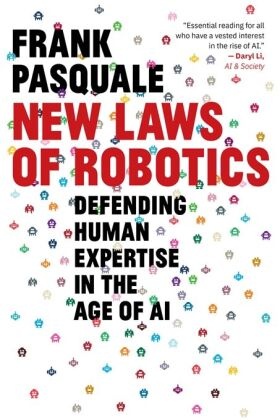New Laws of Robotics - Defending Human Expertise in the Age of AI
| Verlag | Harvard University Press |
| Auflage | 2024 |
| Seiten | 344 |
| Format | 13,0 x 2,0 x 20,5 cm |
| Gewicht | 368 g |
| Artikeltyp | Englisches Buch |
| EAN | 9780674297289 |
| Bestell-Nr | 67429728EA |
"Essential reading for all who have a vested interest in the rise of AI." -Daryl Li, AI & Society "Thought-provoking...Explores how we can best try to ensure that robots work for us, rather than against us, and proposes a new set of laws to provide a conceptual framework for our thinking on the subject." -Financial Times "Pasquale calls for a society-wide reengineering of policy, politics, economics, and labor relations to set technology on a more regulated and egalitarian path...Makes a good case for injecting more bureaucracy into our techno-dreams, if we really want to make the world a better place." -Wired "Pasquale is one of the leading voices on the uneven and often unfair consequences of AI in our society...Every policymaker should read this book and seek his counsel." -Safiya Noble, author of Algorithms of Oppression Too many CEOs tell a simple story about the future of work: if a machine can do what you do, your job will be automated, and you will be replaced. They en vision everyone from doctors to soldiers rendered superfluous by ever-more-powerful AI. Another story is possible. In virtually every walk of life, robotic systems can make labor more valuable, not less. Frank Pasquale tells the story of nurses, teachers, designers, and others who partner with technologists, rather than meekly serving as data sources for their computerized replacements. This cooperation reveals the kind of technological advance that could bring us all better health care, education, and more, while maintaining meaningful work. These partnerships also show how law and regulation can promote prosperity for all, rather than a zero-sum race of humans against machines. Policymakers must not allow corporations or engineers alone to answer questions about how far AI should be entrusted to assume tasks once performed by humans, or about the optimal mix of robotic and human interaction. The kind of automation we get-and who it benefits-will depend on myriad small decision s about how to develop AI. Pasquale proposes ways to democratize that decision-making, rather than centralize it in unaccountable firms. Sober yet optimistic, New Laws of Robotics offers an inspiring vision of technological progress, in which human capacities and expertise are the irreplaceable center of an inclusive economy.

